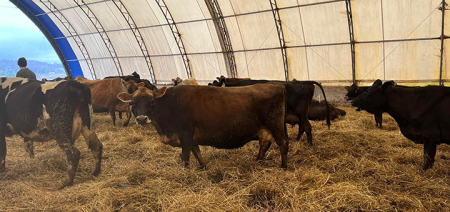Planting Seeds For Our Farming Future
Published:
February 15th, 2016
By:
Sen. James Seward
Farming has served as the backbone of New York’s economy for generations, and in my senate district it is a way of life. In recent years, we have seen new trends – craft food and beverages, Greek yogurt, and farm to table restaurants to name a few – that are helping revitalize New York’s agriculture economy. We need to do all we can to support traditional farming and nurture new ag-businesses.
Recently, I joined with my senate colleagues to announce the senate’s “Planting Seeds” initiative to enhance our agricultural successes and help open doors for our farming future. This new proposal builds upon key elements of the senate Republicans’ successful “Young Farmers” and “Grown in New York” programs that have been enacted over the last five years.
In addition to reductions in broad based tax rates and a statewide property tax cap that is reining in school and municipal taxes, a senate Republican initiative to limit increases in agricultural land assessments has already saved farmers more than $11 million in its very first year. Other measures have reduced the estate tax to help preserve the tradition of family farming, connected young farmers with grants to help them start a new business, and reduced educational costs for those interested in beginning a farming career.
“Planting Seeds” would: provide research, education, and marketing assistance; create new tax and regulatory relief; advance initiatives to expand markets, promote quality, and increase food safety; and create job opportunities for veterans and others interested in farming. Here are just a few of the highlights.
Restoring Funding Cuts
· Since 2011, senate Republicans have succeeded in restoring more than $32 million in budget cuts for agriculture funding. The governor’s 2016-17 budget proposes to cut funding for 42 different programs in the largest single-year reduction in agriculture funding in five years. Senate Republicans will prioritize full restoration of these cuts, and work to achieve record levels of funding to support family farmers.
Strengthening Farmers’ Bottom Lines
· Estate Tax Reform – speed up the full phase-in of the estate tax reform enacted in 2014 as part of the senate’s “Young Farmers” initiative to allow farmers to claim the federal exclusion amount; and
· Farmer Personal Income Tax (PIT) Exemption – reduce taxes on family farmers by raising the PIT exemption for small and mid-sized family farms from the current 5 percent to 20 percent, and making even more farmers eligible for the exemption.
Encouraging Innovation
· Restore budget funding for a third round of Beginning Farmer grants, created as part of the Senate’s 2014 “Young Farmers” initiative to encourage interest in agriculture and help protect the future of family farming. Already, nearly two dozen farms from across the state are benefitting from the first round of $15,000 -$50,000 grants to help young farmers purchase seed, equipment and supplies. A second round of grants will be announced in the near future to help even more new businesses grow;
· Provide new funding for established farmers to help them install innovative new technology to make their farms more efficient and profitable;
· Increase funding for local cooperative extensions, which are often the first point of contact for experienced and beginning farmers in finding solutions to problems and challenges on the farm;
· Increase investment in FarmNet, which provides services and assistance to farmers, including business and farm transition planning; and
· Help dairy farmers who are dealing with price volatility by increasing funding for programs that help find ways to improve profits.
Assisting Our Veterans
· New funding for an innovative proposal by Cornell University to help establish up to five veteran-owned small farms through a first-in-the-nation pilot program. Returning veterans and those seeking a career change could be encouraged to try agriculture, utilizing benefits they’ve earned under the GI Bill to gain training and expertise to begin their own successful small business. In turn, these sites would be available to train additional veteran-farmers in future years.
Author: Sen. James Seward - More From This Author
Comments





(1).jpg)

